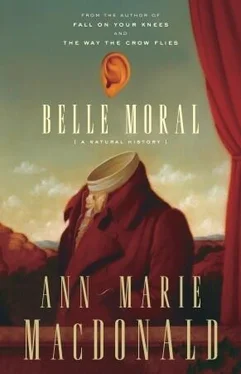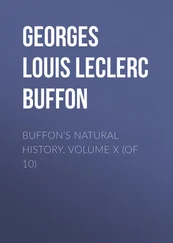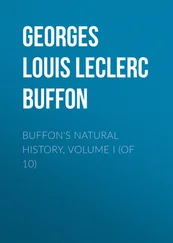A beat .
ABBOTT. I have seen the face of God in a three hundred thousand year old trilobite.
A beat .
PEARL. Seamus, you look at us and see an incoherent jumble. I look and see affinities. Patterns.
VICTOR. A story.
PEARL. That’s right. A plot. You’re probably right, Seamus, we’re probably quite a bad idea, really. We don’t matter a great deal, we’re on the fringes; of empire, of science, art and culture. We cannot even claim the weight of oppression that might yield a diamond eons from now. But perhaps, simply by thinking our thoughts and living our lives with passionate curiosity and unreasonable kindness, we do our part in the slow universal accumulation of — of critical mass, to coin a phrase — that crystallizes in true discovery.
FLORA. Pearl, it’s nigh on four o’clock, your friends will be faimished, come Wee Farleigh and help me –
PEARL [going for her camera] . Don’t you dare move, either of you.
FLORA. Your sister’s faint with hunger, look at her.
PEARL. Of course she’s half-starved, Victor’s turned her into a vegetarian.
VICTOR. How can you talk of kindness, Pearl, and still eat other animals?
PEARL. Don’t start, Victor.
VICTOR. You started it.
PEARL. I didna —! VICTOR. Did —!
FLORA. I’ve a lovely leg of lamb, you’re all to stay; and for the vegetablists, we’ve a … what’s it called, Wee Farleigh?
WEE FARLEIGH. A medley of beans. Baked savoury squash. A casserole of wild champignons and nuts. A milles-feuilles of goat cheese, grilled aubergine, slow-roasted tomato mousse and toasted garlic on a bed of kelp. And for dessert: chocolate éclaires.
PEARL. The éclaires are for everyone, surely.
VICTOR. No, you get a black-pudding for dessert.
PEARL. Seamus, will you stay to tea?
A beat .
DR REID. You are stubborn, clannish and benighted. An apple falls from a tree and you do not shout, “Eureka!”, you eat the apple. You have no real conscience, only sentiment: you’d save the one to the detriment of the many, and call it “kindness”. You lack the mental rigour for true kindness. You shrink from inconvenient facts, preferring a retreat to your hot-house of exotic half-truths; your ramshackle relativism; your primordial swamp; your bog, your blur. You haven’t the strength to withstand the whirlwind, or the unflinching gaze required to see into it. One look at the face of God and you would be annihilated. It is dearly to be hoped that you occupy an evolutionary cul-de-sac. Otherwise, heaven help us all.
Exit , DR REID. PEARL unwinds a cord with a small plunger from the camera and runs it to where the company is assembled for the photo. She holds the plunger and assumes her position in the photo line-up .
PEARL. Ready? [About to press the plunger.] And –
CLAIRE. Ainaibh ri chelie.
YOUNG FARLEIGH wakes up .
PEARL. What does that mean?
YOUNG FARLEIGH. ’Tis Gaelic.
VICTOR. I know “ ’tis Gaelic” –
FLORA. It’s your mother’s clan motto –
CLAIRE. It means: “unite”.
PEARL presses the plunger and the camera responds with a poof and a flash. Curtain . PUPPY barks .
AFTERWORD BY ANN-MARIE MACDONALD
Belle Moral: A Natural History has its origins in an earlier play of mine called The Arab’s Mouth , and the story of its evolution is also the story of a creative relationship. The Arab’s Mouth was first produced in 1990 by Toronto’s Factory Theatre and its then-artistic director, Jackie Maxwell. An interesting sidebar — and natural history is all about the sidebars — is that, at the time, I nurtured hopes that one day the play might be programmed by the Shaw Festival; this, owing to my passion for the period, as well as my enduring regard for the Festival itself, then under the direction of Christopher Newton. Alas, the mandate had yet to be expanded to include works such as mine that were set but not written during Shaw’s lifetime — just as well, for The Arab’s Mouth had some critical evolutionary transformations to undergo before it became Belle Moral .
After The Arab’s Mouth premiered, I knew that it was not quite finished and, in keeping with my experience as a playwright and collaborator, I fully expected to return to it. I got distracted, how ever, by another project which I thought would be a play but turned out to be a novel. Fall On Your Knees developed many of the themes and images that I had touched on in The Arab’s Mouth , and I came to see the play as a progenitor — or, to change metaphors, as a kind of sketch book for the novel. Years went by and I sought to lay to rest the little voice at the back of my mind insisting, “What about me?” The Arab’s Mouth had become a ghost that would not rest, and no amount of fiction, or indeed other theatre work, would quiet it. Thus, when Jackie Maxwell invited me to revisit the piece, I was completely delighted and my initial inner response was, “No.” Writing is hard. Rewriting is harder. And I was scared to look that deeply into my creative past, having never glanced at the script in all those intervening years. What would I find upon re-entering that abandoned house? Would the ghosts be angry? Spoiling for a fight? Or in the mood for a party? And what would my much younger self have to say to me now, an experienced writer striding in to turn it all upside down?
The first step was to read the play again after almost fourteen years. I did so, looking and listening for one thing — a heartbeat. There is a good reason why certain ghosts refuse to rest: they’re not dead. There was indeed a heartbeat. A strong one. I was put in mind of a young race horse, all bony, and pounding with vitality, panting with the passion to run, bursting from the starting gate in all directions at once. It was all over the map, but it was alive.
I did much more work on the script than I, or I think Jackie, expected. Characters and elements of plot that I had once thought of as structurally and thematically integral went the way of the demolition crew without a tremor, clearing the way for new characters as well as new — if certainly fewer — story elements. A great deal had happened in the world and in my life as an artist since 1990, and my world-view had grown. Whereas The Arab’s Mouth was an almost truculent assertion of the primacy of the irrational and the relativistic, Belle Moral reaches out in two directions to reconcile the extremes of rationalism and romanticism, in an attempt to re-envision and to articulate afresh those core Enlightenment values that engendered the freedom and equality that we take for granted at our peril. Today, the forces of fundamentalism threaten to undo that civilized and precious mess we call democracy, substituting simple answers and ruthless solutions in the place of plurality and debate, promoting superstition and prejudice over curiosity and courage. The Scopes Trial is being replayed in North American schools even as real-life chimeras are being created in labs — and moral vacuums — around the world; this mixture of backward thinking and highly sophisticated technology is potentially explosive.
But I’m essentially a comedian. Which is to say, an informed, jaded, jaundiced, optimist. There may be unhappy endings to stories, but all stories are happy, because as long as there are stories, there is hope. If even one person — or indeed, creature — is able to emerge from the rubble of our own making to say, “I remember what happened. Listen, and I’ll tell you,” that’s a happy ending. Bearing witness can be just that: the carrying of a heavy load that eventually must be shared. As long as there is one ancient, flea-bitten, parched and starving mariner able to stagger up to a wedding party and tell his or her tale, there is compassion — that insight which makes the tale intelligible and is the progenitor of imagination. And imagination in turn, if it is not Dr Frankenstein’s longed-for spark of life itself, is certainly the spark of civilization.
Читать дальше












